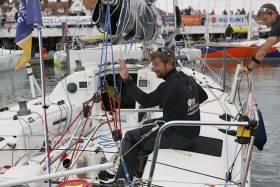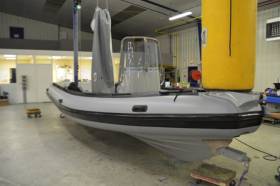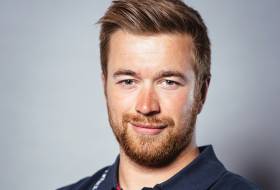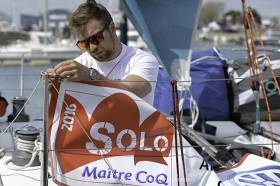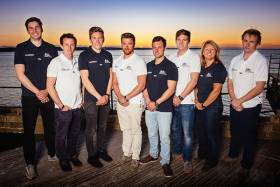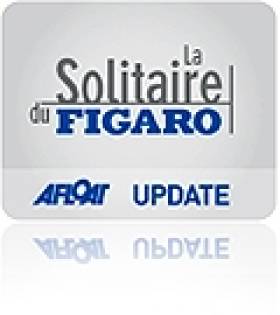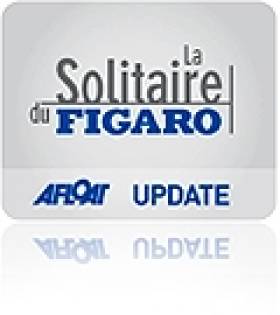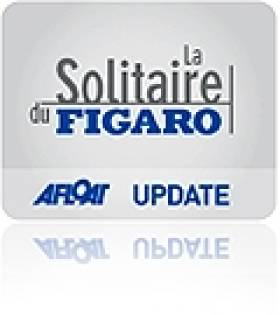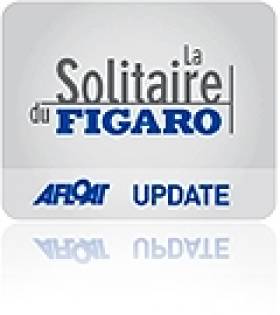Displaying items by tag: Figaro
NI Figaro Sailor Andrew Baker Heading for Paimpol
Northern Ireland solo offshore sailor Andrew Baker was among the Artemis Offshore Academy making an emotional procession out of Cowes Yacht Haven, the pontoons sinking beneath the weight of friends and family cheering them on their way to Paimpol. Starting Leg 2 of the Solitaire Bompard Le Figaro from the famous Royal Yacht Squadron start line, Cowes seafront was lined with the public armed with binoculars and cameras for the spectacle.
“People suggested that the leg we have just completed was the toughest one in memory, so that should mean it will be easier this time! It’s good to get that out of the way. What was important in Cowes was getting enough rest to get back in the game for the next few legs and not burn out. It really was a hard leg with strong winds on the first day and then very feeble winds for the next days. It was tough physically, but nothing you can’t recuperate from with some sleep, Baker said.
"Leaving Cowes after just three days on shore, the Solitaire skippers face a fast but tiring leg"
Leaving Cowes after just three days on shore, the Solitaire skippers face a fast but tiring leg. Zig-zagging their way out of the Solent in 20 knots on the nose with the tide on a magic carpet ride, the fleet can expect to stay in the express lane for most of the way to Paimpol, as Race Director Gilles Chiorri explained.
“On this leg, the fleet will face all of the difficulties associated with the Channel – current, wind and lots of tacking. Another difficulty will be the length of the leg, 430 miles solo is again long to race alone, the current routing shows them spending three days and three nights at sea. There will also be a lot of tactics involved. The skippers who are further back in the ranking after Leg 1 will be on the attack. The Iroise Sea will be one of the most challenging areas of the course, with big wind, big waves and lot of rocks – it will require bravery,” he concluded.
Follow Baker and the fleet here
#Solo - Pictured above is the RIB that French sailor Christophe Maupaté will pilot solo in his quest to set a new Atlantic record from Bordeaux to New York.
Previously attempted by Ireland's own Enda O'Coineen, no one has yet completed a solo transatlantic voyage by RIB.
But as reported on Afloat.ie last December, Figaro veteran Maupaté has been planning his own crossing for some time, having plotted a 4,460-nautical-mile course that will take him from France via Ireland's East Coast, western Scotland, the Faroe Islands and Iceland to the southern tip of Greenland and Canada's Maritimes towards the US – tracing the route of Lafayette's Hermione.
Now Maupaté's record attempt is just weeks away, launching from Bordeaux on Saturday 16 July with a stopover in Dun Laoghaire expected in the first few days.
Northern Ireland solo sailor Andrew Baker has announced his support of UKSA’s youth development campaign ‘#SeaChange’ during the 2016 Solitaire Bompard Le Figaro.
#SeaChange provides life-changing opportunities to schools and groups, disadvantaged and disaffected young people who are not in education, employment or training (NEETs) and young offenders. A common theme for many of these individuals is the low expectation they have of themselves and #SeaChange challenges them to transform and to create opportunities for themselves.
By naming Baker’s blue and white Figaro #SeaChange ahead of the 1525nm race between Deauville, Cowes, Paimpol and La Rochelle, the sailor hopes to raise awareness of the initiative among sailing fans, the media and public across the United Kingdom. For UKSA, Baker is the perfect ambassador to inspire support.
“I’m proud to be supporting the #SeaChange campaign during the Solitaire Bompard Le Figaro and hope through my connection with UKSA and participation in this epic race I am able inspire young people to get into sailing,” he said.
Out sailing with his Dad as soon as he could walk, Baker recognises the importance of getting children into sailing at a young age and the life skills a career on the water can provide.
“#Seachange is a cause I can really relate to,” Baker continued. “I’ve been sailing since a very young age and I have learned so much from the sport. It teaches you about independence, hard work, motivation, determination, camaraderie, the environment and so much more. Being out on the water is such an invaluable experience and I fully support UKSA in their mission.”
The official charity of this year’s UK Solitaire stopover in Cowes, UKSA will be present in the Race Village between 22nd and 26th June offering try sailing, a sailing simulator, interactive game and fund raising.
Ben Willows, Chief Executive of UKSA, is proud to lend the name to Baker’s Figaro for the race, and looks forward to welcoming the sailor to Cowes in a week’s time.
“It is fantastic that Andrew has re branded his boat #SeaChange,” he said. “We are really proud to be a part of La Solitaire Bompard Le Figaro’s UK stopover and to share our #SeaChange message."
“Our ground breaking youth development programmes use water based activities to provide students with both the qualifications and skills to develop themselves. We see first-hand how confidence is developed, as young people are motivated by the prospect of a brighter future; re-engaging with education, further training or a successful transition into to employment.”
Strangford Lough's Hammy Baker Eyes Strong Performance in Second Race of 2016 Figaro Calendar
Strangford Lough sailor Hammy Baker is among a line up of British sailors from the Cowes-based Artemis Offshore Academy are looking to post strong results in the week-long Solo Maitre Coq race that starts from Les Sables d’Olonne today.
With several of the main Figaro competitors currently racing across the Atlantic in the Transat AG2R La Mondiale race, this year’s Solo Maitre Coq – the second of the main build-up races to the Solitaire Bompard Le Figaro in June – offers an opportunity for strong performances from both Artemis Offshore Academy alumni and rookies.
The Maitre Coq starts with two days of inshore racing off Les Sables d’Olonne. After a rest day on Wednesday, there is then a long 280-mile offshore race that could see the sailors at sea for up to three days. The key to a good result is consistency across both disciplines and stamina over what promises to be a tough week of racing in the 33ft Bénéteau Figaro II one-design fleet.
As well as Northern Ireland's Baker there are five British sailors on the 22-boat startline, three alumni sailors – Alan Roberts (Vasco de Gama), Nick Cherry (Redshift) and Hammy Baker (Artemis 64) – and three rookies in Will Harris (Artemis 77), Mary Rook (Artemis 37) and Hugh Brayshaw (Artemis 23).
With strong dinghy racing backgrounds, both Roberts and Cherry will be looking for a good start to the championship and will hope to be well up in the standings after the four inshore races. Baker, who is returning to racing alone after competing in the double-handed division of the Solo Concarneau Trophée Guy Cotten, is hoping to match them.
“My goal is to be in the top-half of the fleet and definitely top-10,” said the Ulsterman, “but then again I have only managed to get two days of training in since the Concarneau race, so I’ll have to see when I get out there…it’s a bit like riding a bike, when you have been off it for while you can still be a bit rusty.”
Among the British rookies Will Harris will be looking to continue the sparkling form he showed in the Solo Concarneau when he started brilliantly and then sailed confidently to finish top-rookie and sixth overall in a 23-boat fleet. Harris is hoping he can bring the same level of performance to the Maitre Coq.
“There is only one guy racing here who was ahead of me in the Concarneau race,” said Harris, aged 22 from Surrey. “In terms of achievement I wouldn’t put a result on it but I want to come away from the week feeling I have given it my all. It’s going to be a very different experience, especially because we have inshore racing this time. If you have a bad start, you haven’t got three days to catch-up. Every race counts and you can’t have a bad result in any of them.”
Charles Darbyshire, director of the Artemis Offshore Academy, is in Les Sables d’Olonne to keep eye on his charges and says the Solo Maitre Coq is another big step on the road to the Figaro for the rookies. “This will give the sailors a flavour of what it is like in the Solitaire in terms of rest and recovery time between races,” he said. “On Monday and Tuesday they will be off the dock at 9.00am and will not be back until seven after a long day on the water. Then they only have Wednesday to recover and plan for the long offshore race which will be two nights at sea.”
The weather forecast for Les Sables d’Olonne promises two light wind races today and then breezier conditions for tomorrow’s inshore contest. The long offshore race was looking like a thrash in 30-knots, but latest predictions suggest a wind range of 10-15 knots, giving a total passage time for the 280-mile course of up to three days.
Will Harris Shines in Figaro Class Opener
Great Britain’s Will Harris was the stand-out performer in the opening race of the 2016 single-handed Figaro circuit, finishing in an impressive sixth place in a fleet of 23 boats on debut.
Harris, aged 22, from Surrey at the helm of Artemis 77, was the top rookie by some distance in the 342-mile Solo Concarneau Trophée Guy Cotten – a tough non-stop, two-day race along the French Brittany coast that saw bitterly cold and, at times, windy conditions.
Harris was one of three British newcomers to the Figaro racing circuit taking part in the Concarneau race who are currently learning their craft at the UK’s Cowes-based Artemis Offshore Academy. Harris was the first non-French skipper to finish the race which was won by France’s Charlie Dalin on Macif 2015.
Harris was delighted with his first performance as a professional and is hoping to maintain – and even improve on this form – as he continues his build-up to his first La Solitaire Bompard – Le Figaro race in June.
“I am very happy with my result but I think it is just a start,” said Harris, still recovering from a decidedly chilly baptism of fire. “It’s a result I still think I can improve on. I can keep working up the field – I am never happy until I am at the front and I was always gaining places, so I am happy with that.”
Harris started the way he finished, at the business end of the fleet, running in seventh place in the early stages. He believes his race management was key to his performance and was determined to try and make sure he got some sleep early in the race. He stuck to his plan, managing three 15-minute naps in the first 12 hours.
“I wanted to make sure I could keep my body going for the next two days and actually manage myself properly,” he said. “I think I slept much earlier than most of the fleet.”
Another key element was Harris’s boat speed in a range of conditions. He was always in or around the top-eight boats and was heartened to see that he could mix it with far more experienced French skippers. “I’ve learnt so much over the past few months of training,” he said. “It is so important to have those few months before going into the racing season where you are just fully focused on making the boat go fast on every point of sail.”
It was not all plain sailing though. Harris found he did not have adequate clothing to keep out the cold and by the second night at sea, he was forced to spend much of his time below as the boat powered through the night. He was also short of decent food and will look at both his clothing and food options before the next race – the Solo Maitre Coq which starts on April 15th.
Charles Darbyshire, the director of the Artemis Offshore Academy, was impressed by Harris’s debut. Harris had been working part time with the Academy over the past two years, while he was still a fulltime student at Southampton University, and Darbyshire believes this was the perfect background for him to learn from other skippers as he prepared to join the Academy himself.
“Will is showing how important the whole Academy experience is for young sailors. Clearly he has been listening and learning from the older sailors on the programme and now he is bringing all that he has leant to bear onto the racecourse. Will is already refining what he is doing on the water and this looks like being a very exciting rookie season for him,” said Darbyshire.
The two other Academy rookies Hugh Brayshaw (Artemis 23) and Mary Rook (Artemis 37) finished the race in 17th and 19th places respectively. Academy alumni sailors Nick Cherry (Redshift) and Alan Roberts (Vasco de Gama) finished ninth and 10th.
The next race on the Figaro calendar is the 320-mile Solo Maitre Coq that starts from Les Sables d’Olonne on the French Biscay coast on April 15th.
See the results in full below.
Follow the Artemis Offshore Academy squad via our website, Facebook and Twitter.
The double-handed division
Position/Co-skippers/Boat name
1. Yann Elies & Antoine Carpentier/Queguiner Leucemie Espoir
2. Sebastien Simon & Xavier Macaire/Bretagne CMB Performance
3. Adrien Hardy & Vincent Biarnes/AGIR Recouvrement
4. Gildas Morvan & Alexis Loison/Cercle Vert
5. Martin Le Pape & Eric Peron/Belloco Paysages
6. Sam Matson & Robin Elsey/Artemis 21
7. Milan Kolacek & Pierre Brasseur/Fulgur – Evapco
8. Andrew Baker & Nicolas Jossier/Artemis 64
9. Tanguy Le Turquais & Hervé Aubry/Cuisine Ixina
10. Tolga Ekrem/Stéphanie Jadaud/Freedom – Service á Domicile
The single-handed division
Position/Co-skippers/Boat name
1. Charlie Dalin/Skipper Macif 2015
2. Yoann Richomme/Skipper Macif 2014
3. Thierry Chabagny/Gedimat
4. Nicolas Lunven/Generali
5. Anthony Marchand/Ovimpex-Secours Populaire
6. Will Harris/Artemis 77
7. Bejamin Dutreux/Team Vendée
8. Corentin Douguet/Sofinther-Un Maillot Pour La Vie
9. Nick Cherry/Redshift
10. Alan Roberts/Vasco de Gama
11. Justine Mettraux/Teamwork
12. Marc Noesmoen/Team Vendée Formation
13. Arthur Le Vaillant/Un Bateau pour Demain
14. Damien Cloarec/Saferail
15. Claire Pruvot/Port de Caen Ouistreham
16. Aymeric Decrooco/Bretagne CMB Espoir
17. Hugh Brayshaw/Artemis 23
18. Pierre Casaux/Welcome to LA
19. Mary Rook/Artemis 37
20. Cécile Laguette/Cecile Cherche Sponsor
DNF – Sophie Faguet/Region Normandie
DNF – Yves Ravot/Hors La Rue
DNF – Arnaud Godart-Philippe/Faun Environnement
French Solo Sailor Aims For Atlantic RIB Record
#Solo - French sailor Christophe Maupaté aims to follow in the wake of Ireland's own Enda O'Coineen in his attempt to be the first person to cross the Atlantic solo from Bordeaux to New York by RIB.
The Figaro veteran will set off on 16 July 2016 from Bordeaux heading north, via the Celtic and Irish Seas – including a stop-over in Dun Laoghaire – on an epic voyage that will see him trace a semi-circle around the North Atlantic.
That route takes Maupaté via the Orkneys, Iceland and the southern tip of Greenland to Canada's Maritimes provinces and onward to New York to coincide with a commemorative voyage by a replica of historic French general Lafayette's ship Hermione.
And he'll be doing it all single-handedly in a 7.5m RIB, a custom French-built Zeppelin, equipped with a Suzuki four-stroke outboard motor and Garmin navigation and communication devices.
The Atlantic has been crossed by RIB several times before, most notably by TV adventurer Bear Grylls and team in 2003 from Canada to Scotland, and more recently by the Brown brothers from Florida to London in 2009.
But the closest anyone's come to a solo RIB crossing was Enda O'Coineen, when he helmed the 5.5m Zodiac RIB Kilcullen III from Halifax in Nova Scotia to Dunmore East in the mid 1980s – a voyage recounted in his book The Unsinkable Kilcullen.
There is no Guinness World Record for O'Coineen's feat, so Maupaté aims to be the first into the books with his own incredible expedition of some 4,460 nautical miles.
More details can be found on the official Bordeaux -> New York in Solitare website HERE.
Back to College for Royal Cork Solo Sailor David Kenefick
#fullrish – Since my last blog update quite a lot has happened and as a result things have changed for my sailing campaign writes Figaro solo sailor David Kenefick.
As I said, after the Figaro I was tired and I needed to reflect on a lot of things. I needed some time to recover and reflect on the last 18 months of my life, which frankly has been a whirlwind. And luckily I have been able to do just that.
It was wonderful to come home after the Figaro in July and see so many friends and familiar faces and take time away from the campaign. As I set about recovering which, in fact took me about 4-5 weeks I began thinking about the future. It quickly became apparent there were two options: either keep sailing or finish my College course which I left over 2 years ago to take up the 'Full Irish' project.
The sailing option was made of mainly two different options. One of these was the possibility of trying to put together a 2016 Vendée Globe project. The Vendée Globe is a single-handed non-stop around the world race in IMOCA 60 sailing boats. It is the toughest sailing race on this planet and for sure is one of the toughest challenges known to man.
I thought about this project for a long time and even had a few meetings with people about it. It was then up to me to decide if I wanted to put myself forward and tell the world my crazy plans to have the first ever Irish boat in the Vendée Globe. The complexity of a project like this is not simple, while I took time to think there were a number of things running through my mind. Have I enough experience? Would I ever find the money that I needed? Would I be able to do a good job?
As the time came to try to put my young head on old shoulders I felt I wouldn't be able to find the correct ingredients to put a solid and safe campaign together along with the thought that sailing will always be there and there is a business degree to be finished. So it was back to college.
Today was my 10th day of college lectures the day it really hit home how much I'm going to miss the Figaro and how lucky I was to do two years in this tough and amazing fleet. One thing is for sure I've got more hunger than ever to do the Figaro race again but for now sailing is on hold.
I would like to thank all my sponsors and everyone who has helped me. A particular mention goes to Marcus Hutchison who introduced me to the Figaro and helped me so much.
#lasolitaire2014 – Ireland's David Kenefick is well placed in the 45th edition of La Solitaire du Figaro - Eric Bompard Cachemire got underway yesterday at noon after the fleet had been moored for several hours off Deauville. Above vid has two nice shots of David in the think of it. Anthony Marchand (Ovimpex Secours Populaire) was first around the two inshore marks followed by Erwan Tabarly (Armor Lux) and David Kenefick (Full Irish) - a great start by the young Irishman who celebrates his 23rd birthday today.
The race didn't get off to the best start for two of the pre-race favourites. Yann Elies (Groupe Queguiner) and Charlie Dalin (Normandy Elite Team) were both recalled after being over the start line as were British sailors, Nick Cherry (Redshift) and Ed Hill (Macmillan Cancer Support). Yann, who is chasing a third consecutive Solitaire win was in last place as the fleet rounded the windward buoy.
In the rookie class, Artemis Offshore Academy member, Rich Mason (Artemis 77) made the best of the inshore course, rounding both marks in 12th place.
The latest weather briefings suggest the sailors are going to hit a transition in the wind when they reach the English coast, particularly between the Owers mark off the Isle of Wight and Start Point. Big splits in the fleet may occur at this point.
Stage one: Deauville to Plymouth, 484 nm.
Top Ten General Rankings as of 15:30BST Sunday (38 total skippers)
1. Erwan Tabarly (Armor Lux)
2. Anthony Marchand (Ovimpex)
3. Sam Goodchild (Team Plymouth)
4. Fabien Delahaye (Skipper Macif 2012)
5. Corentin Horeau (Bretagne - Credit Mutuel Performance
6. David Kenefick (Full Irish)
7. Alexis Loison (Groupe Fiva)
8. Adrien Hardy (Agir Recouvrement)
9. Jeremie Beyou (Maitre Coq)
10 Gildas Morvan (Cercle Vert)
At press time, only 2.36 miles separated the entire fleet.
#fullirsh – David Kenefick finished the Solo Concarneau in 22nd place just before six pm yesterday evening.
After a valuable two days at sea, where the Royal Cork skipper was as high as 15th in the 32–boat fleet at the midway stage, the conclusion from the 'Full Irish' campaign is that the 340–mile offshore has been 'a great training race with a bit of everything in it'. There was a strong wind upwinds in the dark, headlands, short tacking, windy reaching, downwind VMG, transitions from gradient to sea breeze and back.
Saturday morning saw the Figaro fleet of the Solo Concarneau ahead of schedule as the last long leg North from Ile d'Yeu turns out to be a fairly fast two-sail reach. Kenefick rounded the Ile d'Yeu in the small hours and had been hanging in with some of his Lorient-based training partners on the way North.
You can see the results here.
Plymouth Wins Figaro Stop, No Irish Port in 2014 French Grand Prix Event
#figaro – The French La Solitaire du Figaro race will visit Plymouth for the first time in June dashing hopes that the race might return to Ireland.
In spite of an innovative new course including a departure from Bordeaux and a Portuguese stage there will be no Irish leg of the 45th edition of the race and instead the race calls to Britain for the first time in its history.
This year Irish youngster David Kenefick won the Rookie of the year prize and there were hopes that his intended continuation in the circuit might bring the race to Ireland as it previously did in 2012.
The 2,014-mile race is one of the main training grounds for the Vendee Globe race, and this will be the first time it has included a British leg.
Sutton Harbour will host some 45 of the world's top sailors, including local sailor Sam Goodchild. The 24-year-old achieved the best British result since 1975, finishing in 11th place this year.
Around 45 sailors, all on identical 33ft boats will arrive in Sutton Harbour at the end of Leg 1 on Wednesday, June 11.
Spectators will see close-fought inshore racing in Plymouth Sound before the fleets departs on its second leg on Saturday, June 14.
The stopovers were announced at the official Solitaire launch in Paris on Thursday.
More than 30,000 visitors are expected to be lured to Plymouth next summer when the city hosts one of sailing's grand prix events.



























